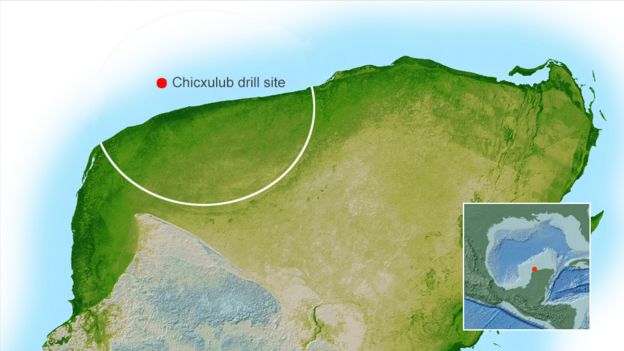As everyone knows, there was a large impact at what is now the Gulf of Mexico (the Chicxulub impact) at the exact time that the non-avian dinosaurs died out . What we don’t really know, though, is how such an impact could wipe out so many species around the globe. It was a big hit for sure, but not necessarily that big. And, don’t forget that the avian dinosaurs and lots of other species did survive.

There are various ideas about what might have happened. Perhaps the body was a comet, with a lot of gook in the slush. Perhaps the dinosaurs were on the edge of extinction anyway, and the impact was a coincidence that finished them off. Perhaps there were fires and volcanoes, that created a ‘nuclear winter’ for a century or more. (There is a layer of soot, indicating something like that.)
This year there have been a series of detailed analyses of the Chicxulub Impact Event (and wouldn’t that be a great name for a band!). Much of the new analysis comes from a drilling expedition sponsored by ECORD, the European Consortium for Ocean Research Drilling, “Expedition 364 Chicxulub K-Pg Impact Crater“. (There is no substitute for actual field research, no?)
The impact was in shallow water, and therefore gouged out a huge amount of the sea floor, which filled the atmosphere with dust [2]. This could have released hundreds of gigatons of CO2 and other chemicals, which could have caused decades of cooling and even longer lasting acidification of the oceans [3].
This fall, a Japanese team suggested that the area of the impact had a relatively high concentration of hydrocarbons in the rock, resulting in an especially large fireball and huge amounts of soot in the atmosphere [5].
And so on.
I’m no expert on geology or climate modelling, so I can’t really dissect these ideas in detail.
There doesn’t seem to be much disagreement that there was a big boom, with tsunamis and huge forest fires, and very probably earthquakes and volcanoes. (The Earth ‘rang like a bell’ as one geologist told me.) For decades after the hit, it looks like there was global cooling and other climate changes—a ‘nuclear winter’ scenario, which killed plants and land animals, and profoundly changed life in the oceans.
It’s clear enough that a Chicxulub scale impact is very bad news for a planet.
But it’s still not clear why the dinosaurs were wiped out everywhere, while plenty of other species survived, including ancestors of birds, frogs, fish, and mammals which lived side-by-side with dinosaurs.
But these new and more detailed studies are giving us a lot to work with. Combined with more and more fossil evidence, we may be able to come up with some ideas about what combination of luck, geography, physiology, and who knows what may have influenced who died out and who survived Chicxulub.
- Jonathan Amos, Asteroid impact plunged dinosaurs into catastrophic ‘winter’, in BBC News – Science & Environment. 2017. http://www.bbc.com/news/science-environment-41825471
- Jonathan Amos, Dinosaur asteroid hit ‘worst possible place’, in BBC News – Science and Environment. 2017. http://www.bbc.com/news/science-environment-39922998
- Natalia Artemieva, Joanna Morgan, and Expedition 364 Science Party, Quantifying the Release of Climate-Active Gases by Large Meteorite Impacts With a Case Study of Chicxulub. Geophysical Research Letters, 44 (20):10,180-10,188, 2017. http://dx.doi.org/10.1002/2017GL074879
- Julia Brugger, Georg Feulner, and Stefan Petri, Baby, it’s cold outside: Climate model simulations of the effects of the asteroid impact at the end of the Cretaceous. Geophysical Research Letters, 44 (1):419-427, 2017. http://dx.doi.org/10.1002/2016GL072241
- Kunio Kaiho and Naga Oshima, Site of asteroid impact changed the history of life on Earth: the low probability of mass extinction. Scientific Reports, 7 (1):14855, 2017/11/09 2017. https://doi.org/10.1038/s41598-017-14199-x
PS. Some great names for bands:
Chicxulub
The Chicxulub Event
We Are Children of Chicxulub
Thanks to Chicxulub
Brought to You By Chicxulub

8 thoughts on “New Studies About The Chicxulub Asteroid Impact”